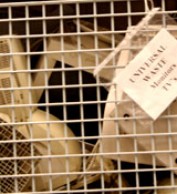Universal Wastes
Certain wastes (such as batteries, pesticides, cathode ray tubes, fluorescent bulbs, etc.) widely generated by households, businesses and industries can be hazardous to the environment if not disposed of properly. The Federal Environmental Protection Agency (EPA) and Massachusetts Department of Environmental Protection (MA DEP) regulates these types of products under the "Universal Waste Rule." To comply with these regulations, as well as to help protect the environment and to decrease disposal costs, Gordon College recycles all of the following products:
- Batteries
- CRTs
- Fluorescent Light Bulbs
- Motor Oil
- Thermometers (and Thermostats)
Of course, just like the recycling of bottles, cans and paper, we can't do this properly without the help of the Gordon community! Please do your best to recycle these potentially hazardous items by following the steps below. Besides being the law, it is just the right thing to do as good stewards of God's creation.
BATTERIES
- Different types of batteries usually contain various kinds of heavy metals. These include nickel, cadmium, mercury, lithium, and lead. Gordon College recycles its batteries, and is asking students to do the same.
- Alkaline batteries, such as non-rechargeable AA batteries, are an exception. Domestically manufactured alkaline batteries made after 1994 no longer contain mercury and can be disposed of in the trash. Imported batteries may still contain mercury, so be sure to check the label before throwing them away.
What you can do:
- NiCad, lithium, and button type batteries should be recycled by placing them in the appropriate recycling bin, marked for batteries, located in most campus buildings.
- Car Batteries, which are lead-acid batteries, may be returned where you purchased the replacement battery. Most automotive battery retailers will accept used batteries when purchasing a new one. Many garages, auto salvage operations, and scrap metal yards will take automotive batteries, provided they are not broken or leaking. Some will even pay you a dollar or so for each battery.
Cathode ray tubes (CRTs) are the types of screens used in standard computer monitors and televisions. A typical computer monitor or TV may contain 4-5 pounds of lead, depending on the size and make. Because lead and the chemicals often used in the plastic material of the case are harmful to the environment, CRTs must be recycled rather than thrown in the trash. NOTE: although it can be seen as fun to some, smashing CRT screens can release the lead into the environment, so please don't do it.
What you can do:
If you have an old computer monitor or television, please bring it to the Physical Plant loading dock. Physical Plant will make all arrangements for the proper disposal and recycling of all CRTs it receives. To cover our costs, a donation of $5 per unit is requested, but not required.
FLUORESCENT LIGHT BULBS
Most fluorescent light bulbs contain varying amounts of mercury vapor, which is released into the atmosphere when the bulb is broken. Though a single bulb is really not harmful, to protect the environment from the cumulative effect, these bulbs should always be recycled with special processing. This includes the long, straight bulbs found in most ceiling lights, as well as U-Tubes, circular, and compact bulbs found in many other light fixtures. Even though they may contain mercury, compact fluorescent bulbs are a good choice because they conserve energy and last much longer than standard incandescent lights.
What you can do:
Please return all fluorescent bulbs, particularly those labeled "Gordon Conserves," to Physical Plant for disposal when they burn out. If you use fluorescent bulbs in your personally owned lamps, you may bring them Physical Plant for recycling as well.
MOTOR OIL
Though motor oil is not technically included in the Universal Waste Rule, Gordon College recycles all used motor oil from College owned vehicles and machinery. Like glass, paper and plastic, disposing of this material by recycling both saves us money and helps protect the environment.
What you can do:
- If you change the oil in your vehicle yourself, you should return used oil for recycling to the store where you purchased it so it can be recycled. Retailers are required to accept used oil for recycling (up to 2 gallons per person per day) if you have the purchase receipt. Some service stations and repair garages that do not sell motor oil but burn the oil to heat their garage will also take used oil.
- Though we prefer that you dispose of used oil as outlined above, the Physical Plant vehicle shop will accept it (Monday-Friday from 8-4:30) for recycling with our motor oil, however, to cover our costs a donation of $5 is requested, though not required. Never dispose of used oil on the ground, down a drain or in the trash, and don't leave containers of used oil sitting around in parking lots. Be responsible by disposing of all wastes properly.
THERMOMETERS
Various items, such as thermometers and thermostats, contain liquid mercury, which is a toxic and environmentally harmful metal.
What you can do:
Try to use alternative products that do not contain mercury. Because of the potential environmental and health hazards, mercury thermometers have been banned from sale in many locations. The Student Handbook states that we have also banned the use of such thermometers on campus.
If you do have items that contain mercury, be careful with them. Do not throw any mercury containing product in the trash! If you break such an item, notify Physical Plant for help in recycling or disposing of it.
PLEASE RECYCLE!


 Campus Involvement
Campus Involvement Universal Wastes
Universal Wastes


